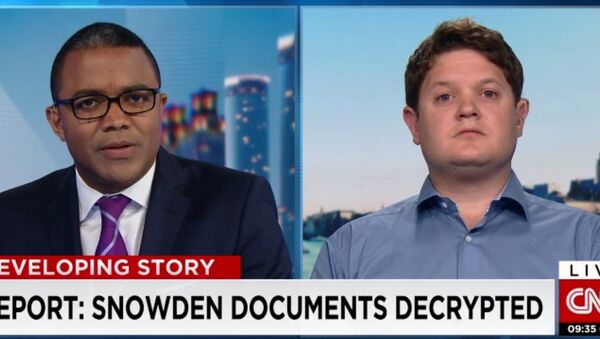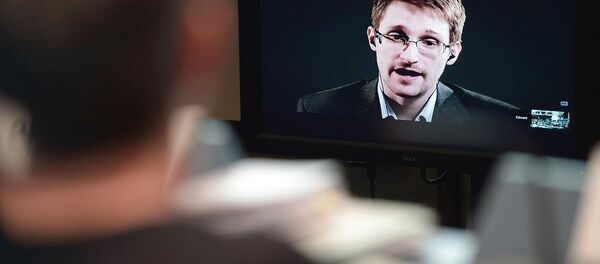Reporter Tom Harper's defense of his piece in a television interview has further stoked the fires of criticism.
The article (which is behind a paywall, though the full text has been posted here) cited unnamed government sources at Downing Street and the Home Office to assert that Russian and Chinese intelligence services had hacked into a "top-secret cache of files" leaked by former US National Security Agency contractor Edward Snowden.
A senior Downing Street source was quoted in the paper as saying: "It is the case that Russians and Chinese have information. It has meant agents have had to be moved and that knowledge of how we operate has stopped us getting vital information. There is no evidence of anyone being harmed."
The Times article, under the headline 'British Spies Betrayed to Russians and Chinese,' also claimed that the documents "contain details of secret intelligence techniques and information that could allow British and American spies to be identified."
— Xeni Jardin (@xeni) June 15, 2015
China has responded that they have no information pertaining to the pullout of British intelligence agents, according to a foreign ministry spokesman.
The report comes as the UK government is considering a new surveillance law — the so-called Snooper's Charter — and the reaction to the flimsy reporting of a story clearly in the service of government interests has been swift and the judgement harsh.
And it's only gotten worse since Tom Harper, the reporter who wrote it, appeared on CNN to "defend" his piece.
— Glenn Greenwald (@ggreenwald) June 15, 2015
Harper admits off the bat that he himself doesn't know how senior British officials know about the break of files, and doesn't even seem to have the government's story on how they know.
"All we know is that, effectively, this is the official position of the British government," Harper told CNN's George Howell.
— Johnathan Donaldson (@DonJohnaldson) June 15, 2015
Harper says he and his colleagues worked on the story for a while, "trying to stand it up through multiple sources," but none of those appear to have come from outside the government establishment, which clearly has an interest in protecting their surveillance programs and smearing as dangerous those whistleblowers who, like Snowden, would expose them.
Harper says in the interview that the Times took their 'evidence' to British officials, who confirmed it all, which begs the question of what that evidence was since, besides those anonymous, official confirmations, no other sources or documents are presented in the article.
— Asa Winstanley (@AsaWinstanley) June 15, 2015
He later comments that the story was itself originally picked up from "an extremely well-placed source in the Home Office," meaning that the story he presented to the government for confirmation was the government's own story from the beginning.
The Times reporter also admits he has no idea how the British government would know what was in the files, or even whether the files were stolen or given over willingly by Snowden — a possibility the article dangles at its readers without clarifying or substantiating.
"We just publish what we believe to be the position of the British government," Harper said, immediately sealing his social media doom.
— HannahJane Parkinson (@ladyhaja) June 15, 2015
"As far as the evidence, you know, to substantiate it, you're not really able to comment or to explain that at this point, right?" the CNN host asks Harper.
"No," Harper responds.
Gov't Smearing Snowden as Traitor, Leaks as Dangerous
The Sunday Times article cites an (again anonymous) British official saying that Snowden has "blood on his hands" in the same sentence that it reports no one appears to have been hurt by the supposed leaks.
Later, the article asserts that "since he exposed western intelligence-gathering methods, the security services have reported increasing difficulty in the monitoring of terrorists and other dangerous criminals via digital communications including email, phone contact, chat rooms and social media." Again, with no supporting evidence.
— Just Security (@just_security) June 15, 2015
Another anonymous source, this time from the US intelligence community, warns that harm done my Snowden's leaks is "far greater than what has been admitted."
This overwhelmingly negative and alarmist assessment of the leaks comes at a time when the US has been forced to change some of its surveillance legislation as a direct consequence of the Snowden leaks and public opinion about the former NSA contractor had become more favorable.
Similarly, after Daniel Ellsberg leaked top secret documents about the Vietnam War, Nixon officials planted stories that were swallowed whole and published by the New York Times, for one, accusing Ellsberg of handing over secrets to the Soviet Union.
— mary hendrix (@hendry118) June 14, 2015
"[T]he entire report is a self-negating joke," Glenn Greenwald — who won a Pulitzer for his work publishing the original stories on the leaked documents — wrote at The Intercept. "It reads like a parody I might quickly whip up in order to illustrate the core sickness of Western journalism."
Perhaps, though, there is a silver lining for media educators.
— Glenn Greenwald (@ggreenwald) June 15, 2015



